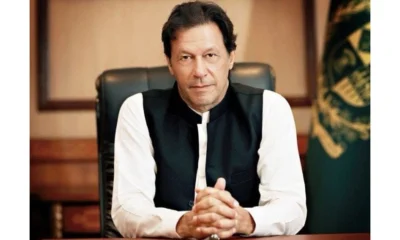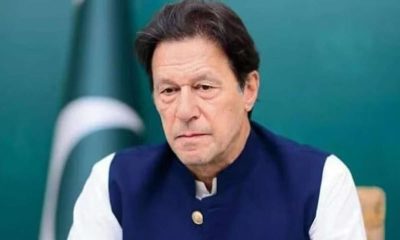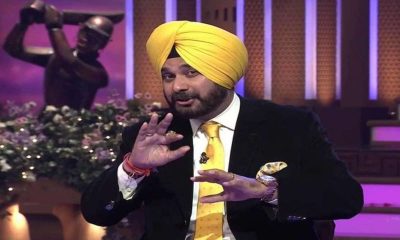Attacked by critics for his visit to Pakistan for Imran Khan’s oath ceremony and a hug shared with the Pakistani army chief, cricketer-turned-minister Navjot Singh Sidhu got a message of thanks and support from across the border as well as war veterans of Indian army.
Pakistan Prime Minister Imran Khan came out in support of Punjab Minister Navjot Singh Sidhu, who has been under fire for hugging Pakistan Army chief General Qamar Javed Bajwa during Khan’s oath-taking ceremony.
Thanking the cricketer-turned-politician for attending his oath ceremony, Khan tweeted: “I want to thank Sidhu for coming to Pakistan for my oath taking. He was an ambassador of peace & was given amazing love & affection by ppl of Pakistan. Those in India who targeted him are doing a gt disservice to peace in the subcontinent – without peace our ppl cannot progress.”
While defending his friend, Imran Khan also seized the chance to push dialogue and trade between the two countries. Just after his election victory, PM Modi had written to him expressing India’s commitment to “meaningful and constructive engagement”.
He added in another tweet: “To move forward Pakistan and India must dialogue and resolve their conflicts incl Kashmir: The best way to alleviate poverty and uplift the people of the subcontinent is to resolve our differences through dialogue and start trading”
Sidhu had also held a press conference earlier in the day and termed the hug ‘an emotional moment’, which arose after Bajwa told him that efforts were being made to open the corridor to Kartarpur Sahib.
“Pakistan Army chief said they were making efforts to open corridor to Kartarpur Sahib, what followed was emotional moment,” Sidhu said, adding that his visit to Pakistan was not political but “just a warm invitation from a friend”.
He also responded to criticism over being seated in the front row, next to Pakistan Occupied Kashmir “president” Masood Khan, during the swearing-in ceremony on Saturday. “My seat was changed at the last minute. I was told just 5 minutes before ceremony that I was to be seated on front row. I sat wherever they made me sit,” Navjot Singh Sidhu said.
Sidhu was the only Indian to attend the oath-taking ceremony at the Aiwan-e-Sadr (the President House) in Islamabad, on the invitation of Imran Khan, his contemporary and friend from their cricket days.
Following his statement, the BJP slammed him and said that it is unbelievable how someone can hold a press conference in support of Pakistan.
Even Sidhu’s boss, Punjab Chief Minister Amarinder Singh Amarinder Singh, who has not shared the best of ties with his minister, had earlier ticked off Sidhu publicly, saying “I think it was wrong for him (Navjot Singh) to have shown the affection he did for the Pakistan Army chief, I am not in its favour… The fact is that the man (Mr Sidhu) should understand that our soldiers are being killed everyday. My own regiment lost one major and two jawans a few months ago,” the Chief Minister had said.
Sidhu, asserting that his visit was “not about politics” but a warm invite from an old friend, pointed out that former prime minister Atal Bihari Vajpayee had travelled on the bus to Lahore and Prime Minister Narendra Modi made an unscheduled trip to Lahore in 2015, on his way back from an official visit to Afghanistan.
During that surprise stopover, he said, PM Modi had hugged then prime minister Nawaz Sharif.
“No one is questioning PM Modi,” Navjot Singh Sidhu said.
On criticism from his own boss, Punjab Chief Minister Amarinder Singh, he said: “I was criticised by the Captain, by top Congress leaders. It is not necessary that if the Captain has spoken against me, I should too.”
You can’t, he added pointedly, try to please everybody. “He who tries to, pleases nobody.”
It didn’t silence the BJP, though. “Sidhu’s visit to Pakistan is shameful,” said Punjab BJP chief Shwait Malik.
“On one side, the Pakistan army was involved in attacking our soldiers at the border and on the other side Sidhu was hugging the Army chief. Does it mean he was thanking him for killing our jawans?” he asked.
However, Sidhu was backed by several veteran Army officers who termed the barbs being directed at the minister for his “hug” as “petty”, reported The Indian Express (IE) after talking to officers who are veterans of wars against Pakistan.
“We should not be petty. The man goes there and someone comes up to him and they hug each other, so what…We are big country and we should behave like a big country. Japhi paa layi te fer kee hoya (If they hugged each other, so what) It is the Punjabi way to greet somebody,” IE quoted Lt General Depinder Singh (retd) as saying.
Lt General Tej Sapru (retd) said: “I do not think he has done anything wrong. We must look at it from the macro level. By hugging, it does not mean that he has sold the country out. If someone can hug the Prime Minister of Pakistan then the Army Chief comes under the PM. Here he has just hugged a person who came to him and said hello…If he has hugged him no heavens have fallen. He has not told him that we will not fire on them on the LoC.”
Lt General H S Panag (retd) said: “So what if he hugged the Pak Army Chief?…The right wing which is making all the noise because they know they do not have the capability of doing anything to Pakistan. I have attended seminars where retired Pakistani Army officers also come and we hug each other. It is a non-issue.”
A telling remark was from Brigadier Surinder Singh (retd) who said: “At least some channel of communication should be kept open with the Pak Army Chief. There can be back channel diplomacy through such common meeting ground. People criticising this are fools. When we meet Pakistani counterparts at flag meetings we meet with due regards with each other. And when need be we kill each other also.”























